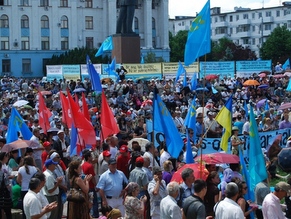The Crimean Tatar Issue: A Government in Dangerous Denial

In Remembrance of the Victims of the Deportation, May 18, 2012 (Simferopol)
The standard denial by Ukrainian officials of discrimination, racism and other ills took on new dimensions last month when Ukraine’s Foreign Minister effectively denied the existence of problems not just experienced by the Crimean Tatars but documented in detail by major European structures.
It is impossible not to share the frustration expressed by Natalya Belitser from the Pylyp Orlyk Institute of Democracy during an address given in Simferopol on Oct. 3. She focused on the Crimean Tatar issue in the context of Ukraine’s European integration, the importance of which seems to be understood by all barring those holding high office in Ukraine.
The Crimean Tatar issue was not one of the 11 priority areas on the list drawn up by Štefan Füle, EU Commissioner on Enlargement and European Neighbourhood Policy (the Füle List). This list, later shortened, was of key commitments which Ukraine had to fulfil or have made significant steps towards fulfilling for the EU-Ukraine Association Agreement to be signed at the end of November.
No intellectual feat is needed to understand that the absence of an issue from this list does not mean that it doesn’t exist. Indeed Füle’s address at the Conference on the Rights of Crimean Tatars on Sept. 19 made the EU’s recognition of its importance abundantly clear. The Commissioner highlighted a number of key issues needing reflection, namely: the legal aspects of return for formerly deported Crimean Tatars returning to their original homeland; the issue of land, housing and property; political participation; socio-economic aspects of return and integration; the issue of language, culture and religion; and that of education. His address was largely based on the conclusions and recommendations of a vital report commissioned by the OSCE High Commissioner for National Minorities [HCNM]
With European integration very much on the agenda, it is immensely regrettable that Ukraine’s Foreign Minister Leonid Kozhara and the Crimean Prime Minister Anatoly Mohylyov created the impression that Ukraine’s leaders are living in some kind of parallel universe. Following the Sept. 19 meeting, Kozhara stated that the government was not planning to use the OSCE HCNM report; that the Crimean Tatars do not face any form of discrimination but enjoy all the same rights as other citizens of Ukraine. And that’s that then.
Or not quite the end of the story and this is not just because stubborn denial will not make the problems faced by the Crimean Tatars go away. According to Belitser, during the Sept. 19 meeting, “the Foreign Minister saw fit to ignore the presence of representatives of the Office of the High Commissioner on National Minorities - its Head, Ilse Brand-Kekhris; Senior Legal Adviser Vincent de Graaf and Senior Political Adviser Bob Dean”. She suggests that this extraordinary behaviour must make European and international representatives doubt the Ukrainian leadership’s stated commitment to observing European standards on the rights of minorities.
Such doubts are felt by Crimean Tatars and those closely following the situation in the Crimea. The problems identified in the above-mentioned reports, as well as others such as the European Commission against Racism and Intolerance: Fourth Monitoring Report and US State Department Report, are long-standing, and the current regime is not the first to be failing to address them properly.
There have, however, been a number of worrying developments over the last three years.
Concern over President Yanukovych’s appointment of Anatoly Mohylyov, known for his notorious hate speech and actions as head of the Crimean police to the post of Prime Minister of the Crimea in November 2011 has proven well-founded. Few analysts believe that Mohylyov’s confrontational approach and efforts to undermine the Mejlis of the Crimean Tatar People do not have the president’s support. People from extremely marginal groups have been placed in positions previously held by members of the Mejlis, seemingly on the basis of their likely loyalty to those presently in power.
The old lie about supposed Crimean Tatar collaboration with the Nazis used as Stalin’s excuse for the Deportation in 1944 has recently appeared in a book published with Crimean local authority funding. Since the Soviet regime itself acknowledged back in 1967 that the allegations were unfounded, the motives of all those rehashing the lie must be questioned.
It is worth remembering one warning from the OSCE report which Ukraine’s Government has chosen to dismiss:
“Crimea faces a volatile mixture of acrimonious political competition, socio-economic exclusion, inter- and intra-religious strife and a general atmosphere of increasing intolerance. The risk of inter-ethnic violence is real and requires urgent attention, both from Ukraine and from its international partners.”
A policy of denial is always doomed to failure. When accompanied by ill-considered and provocative actions, and astounding disregard for offers of assistance, it is also dangerous.





